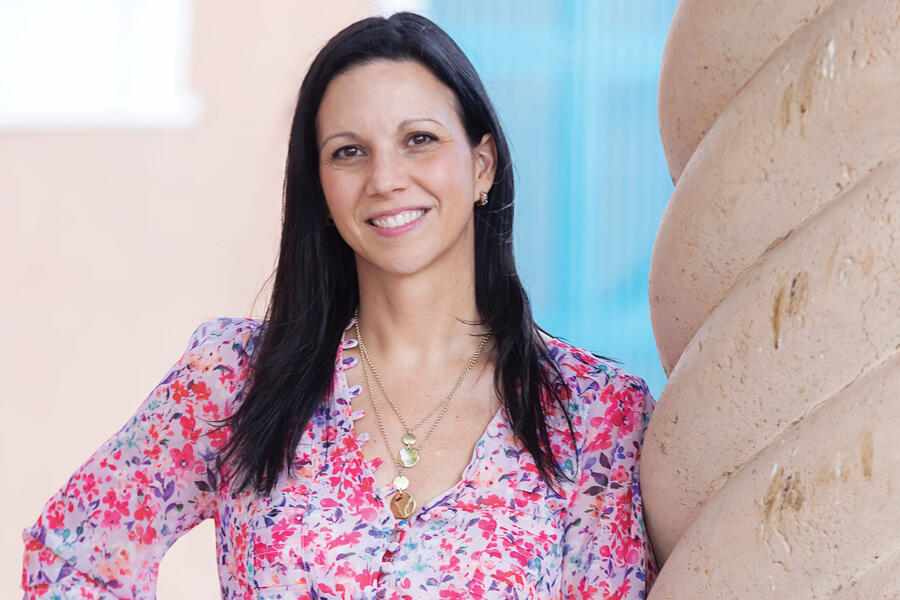When Leah Messina, Bus '10 (MS), was a 24-year-old Carey Business School student, she founded digital marketing agency Sinuate Media in her Baltimore apartment. Now headquartered in Las Cruces, New Mexico, with a recently opened office in New York City, Sinuate Media's clients span 23 states and five countries.
Messina abandoned her focus on an intended career in the magazine industry and, after college, found work at a marketing agency. After a few years, she recalls, "I wanted to start my own business, and I went to Hopkins to learn the academic principles of marketing as my foundation."
Across 19 years, Messina has guided Sinuate Media with savvy decisions that anticipate industry shifts. Today, Sinuate's services have evolved to include not only omni-channel marketing but also technology training and fractional chief marketing officer expertise.
Can you share a recent success story?
Maryland-based G&M Restaurant already had a strong brand personality and hired us to create a sustainable e-commerce revenue stream "beyond tables" that could weather economic fluctuations.
We didn't want to change what clearly worked, but we needed to connect their brand with future online customers to prepare for a successful e-commerce launch. First came a Facebook presence: Branded photos are critical for Facebook and email, but they have to be the right photos.
A photo that gets a huge reaction every year around holiday time is FedEx trucks packed to the roofs with boxes of crabcakes ready for delivery. People like looking behind the scenes—and wondering if their box is on that truck! G&M's customers are family oriented and love Maryland-themed "insider" jokes, and we have a lot of fun with that when it comes to marketing. For them, Facebook and emails work. For other businesses, brand awareness outreach might incorporate getting the client interviewed on a podcast, on TV, in a magazine, or on "best of" lists.
Early on, you trademarked the term "organic marketing," which you held for 10 years. How did this concept drive your early success?
I actually came up with the idea in one of my classes at Hopkins. Organic marketing combines marketing subdisciplines in ways that help a client organically rise up in a search engine. We use a client's existing assets in creative ways that maximize their exposure by designing experiences that connect them to potential new customers beyond their traditional audience.
For example, we worked with the National Hockey League. We brought in hockey fanatics with large social media followings—basically early social media influencers—to live-tweet their games. The NHL had never done anything like that before, and it was hugely successful. We did something similar for the Tour de France, and their ratings skyrocketed.
So many businesses fail: What is the secret sauce for Sinuate Media's ongoing success? What are your strengths that make it possible?
I come from a long line of entrepreneurs, and knowing the importance of relationships is a strength. Much of our business comes from referrals. Also, I've had a lot of experience with startups and have a solid understanding of what will fail, what can succeed. Our special sauce is staying focused on the client's goals. What do they want to achieve? What spending does or doesn't make sense to reach their goal? I treat each budget as if it were my own.
What were some challenges in getting Sinuate Media up and running? Were there any setbacks?
In the beginning, it was establishing credibility. I was young—but I knew what I was doing. I did many presentations on organic marketing, and as I landed clients, I had proof of success.
The 2008 financial collapse was our largest setback. Much of our work was tied up with one client, and they decided to bring most of what we did in-house. We basically rebuilt from scratch, but positive changes were the result. For instance, we went from project-based to retainer work.
The pandemic was actually a period of incredibly fast growth. We gained a lot of clients from the health care space and had to hire a lot of staff quickly. After March 23, 2020, our first day off was July 4.
What's next for Sinuate Media?
Currently, we're focused on growth and scaling. We've opened an office in New York City, where we're developing our food and beverage industry work. We recently launched a podcast called "Recipe to Revenue" that features in-depth interviews with industry leaders.
With artificial intelligence, we're in the middle of another technical revolution, and digital marketing will look very different in the coming years. Regardless of the latest and greatest marketing technology, using the fundamentals of marketing strategy is always the most crucial aspect of our work. No matter the technology, those marketing concepts power everything.
What (so far) has been the high point of your career?
When my son was in pre-K, he told all his friends that I invented social media. [Messina laughs.] That made my whole year.
Posted in Alumni
Tagged carey business school








